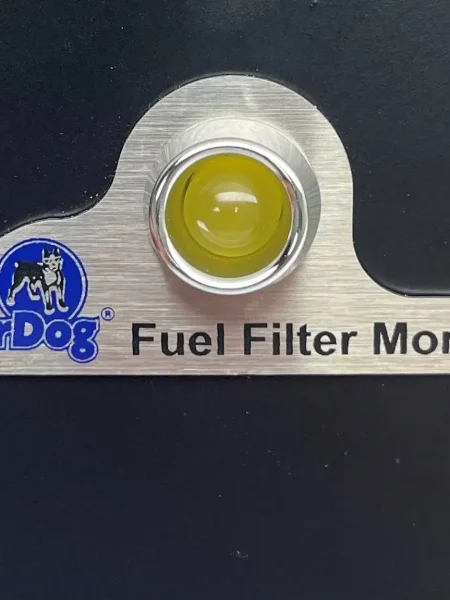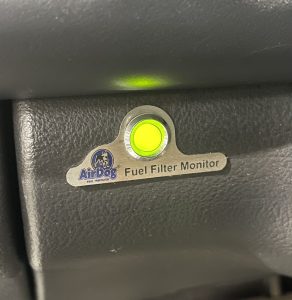

If you use an AirDog® fuel system, chances are you understand the importance of getting clean fuel to your engine. That’s why you invested in the best diesel fuel filtration system out there. But if a filter is working correctly, it’s removing contaminants from the fuel—which means it will eventually clog.
Knowing how to tell if your diesel fuel filter is bad is important so you know when to install a new filter to keep your system running optimally. Otherwise, you won’t get the right amount of clean fuel at the right amount of pressure on your fuel injectors.
The AirDog® system serves as the primary fuel filter in most trucks in which it’s installed. Unlike the simple filters that are installed by the factory, the AirDog® system is more comprehensive and better optimized for performance and longevity. It includes a water separator to remove water from the fuel, a particulate filter to remove debris, and a fuel pump to maintain optimal pressure to the fuel injectors.
The AirDog® system goes multiple steps further than a traditional diesel fuel filter system to ensure fuel quality and engine performance. It’s an unfortunate reality that even the highest-quality diesel fuel tends to become contaminated as it makes its way from the refinery to the tanker, then onward to the filling station and into your fuel tank. Water is often present, debris is common, and entrained air is inevitable as the fuel sloshes around from tank to tank.
AirDog® pulls the water out, removes the debris, and goes above and beyond by maintaining pressure to prevent further vapor formation. It’s such an effective combination of filtration and optimization that it can prolong the life of engines and engine components, improve fuel economy, better performance, and more.
Of course, all of this is only possible if the filter medium is working correctly. If it gets clogged for whatever reason—and they all get clogged eventually—it’s necessary to change out the filter to keep the system operating as intended. That’s why the system includes an indicator light on the dashboard to let you know when it’s time to change the filter.
We want to ensure that your system is always working the best it can, which is why we try to make it as easy as possible to know when to change your filter. The dashboard indicator light is your first line of defense. However, it’s worth knowing the other symptoms of a bad fuel filter so you have multiple ways to take proper care of your system.
The installation of the AirDog® system includes the installation of an indicator light on the dashboard. This light is connected directly to a pressure sensor on the AirDog® system that monitors the outlet pressure of the fuel pump. If the pressure drops below 5 PSI, the light will come on. It’s an excellent indicator that the fuel filter is blocked up enough to reduce the pressure in the system. When it comes on, you know it’s time to change the filter.
Another way you might discover that there is an issue with the filter is if you notice reduced engine performance. This can be particularly noticeable while climbing hills or at high RPMs. Reduced throttle response can indicate that the filter is clogged and must be replaced.
The filter change light is handy to have, but for true optimization of your system, we recommend keeping detailed records of your truck maintenance. Knowing where you are mileage-wise for your fuel filter change interval means you won’t ever miss the optimal time to change the filter. The light tells you it’s clogged, but if you just change the filters at the designated changing intervals you can get ahead of a clog and can avoid experiencing performance issues out on the road.
Sometimes we get phone calls from customers saying they are having problems with their system. One of the first questions we ask is, “When was the last time you changed your filters?” Sometimes people forget the ideal changing intervals, and sometimes they never knew them in the first place. Once they know how often to change the filters, they are less likely to run into a clogged system.
How long do fuel filters last? It depends on several factors, including the specific filter you are using. We recommend reading the instructions that come with your specific filters to be sure you are changing them at the right time. For example, our FF200 filter can last up to 40,000 miles, but not all aftermarket filters will necessarily last so long.
Many factors at play can affect filter life. Some of these include:
Not all fuel is made equal. Some high-quality sellers deliver excellent diesel fuel to consumers, while others offer a product that is less than ideal. The lower the quality of the fuel, the more contaminants it’s likely to contain and the more quickly it can clog your fuel filter.
There can be fuel quality issues in different regions as well. That’s why it’s a good idea to talk to your fellow drivers about fuel when you get a chance. Many of the worst quality sources are well-known if you ask around.
The water separator in the AirDog® system is excellent at pulling water out of diesel fuel, but it can only do so much. If you use fuel that has a lot of water in it, such as from a low-quality supplier, your water separator can quickly become clogged. At that point, the only thing you can do is change the water separator.
Another problem that can lead to clogged filters is cold weather conditions. In sub-zero temperatures, diesel fuel can gel and clog your whole system. It’s important to treat your fuel properly to keep it from gelling if you are operating in such conditions.
There aren’t usually many signs that your fuel is about to gel, which is why it’s so important to plan ahead and purchase winterized fuel when you know the temperature is going to get low. You should also consider adding anti-gel additives to your fuel tank each time you fill up in sub-zero temperatures.
There are a few things you can do to help maintain your AirDog® system, including:
Regular Monitoring

Pay attention to your dashboard indicator light. If it turns on and stays on, it’s best to change the filters as soon as possible. It’s also helpful to monitor your engine performance when hauling uphill and at high RPMs.
You might also consider installing a restriction sensor on the AirDog® pump. It’s possible to install a port into the pump to install a restriction sensor for more precise monitoring. If you have questions about this option feel free to give us a call to discuss it.
We think the simplest way to ensure optimal fuel filtration is to change filters at regular intervals. As a general recommendation, we tell customers to change the fuel filter and water separator every 35,000-40,000 miles. You might find that you can wait a little longer, depending on the filter you use and the conditions you operate in, but this is a safe interval that will ensure optimal protection for your engine.
If you are going to be operating in freezing temperatures, it’s always a good idea to add an anti-gel solution to your fuel tank when you fill up along with purchasing winterized fuel.
Running high-quality fuel in your engine is also important. Lower-quality fuel is more likely to gum up your filters and your engine. There are endless debates about which fuel is best. In general, you can purchase premium diesel and know that you are likely getting a good product. It’s a good idea to experiment and see which fuel works best with your engine.
If you are having persistent issues with your filtration system, it may be necessary to get professional assistance. You can always have a diesel mechanic look things over and try to identify the issue. You can also give us a call during normal business hours if you have questions about your AirDog® system or contact an authorized service center.
Our office phone is (877) 463-4373.
Your AirDog® system will serve you reliably for years, but you do need to change your filters regularly to keep it running at its best. Follow the tips above, particularly changing the filters at prescribed intervals and paying attention to the indicator light, to protect your system and your valuable engine.